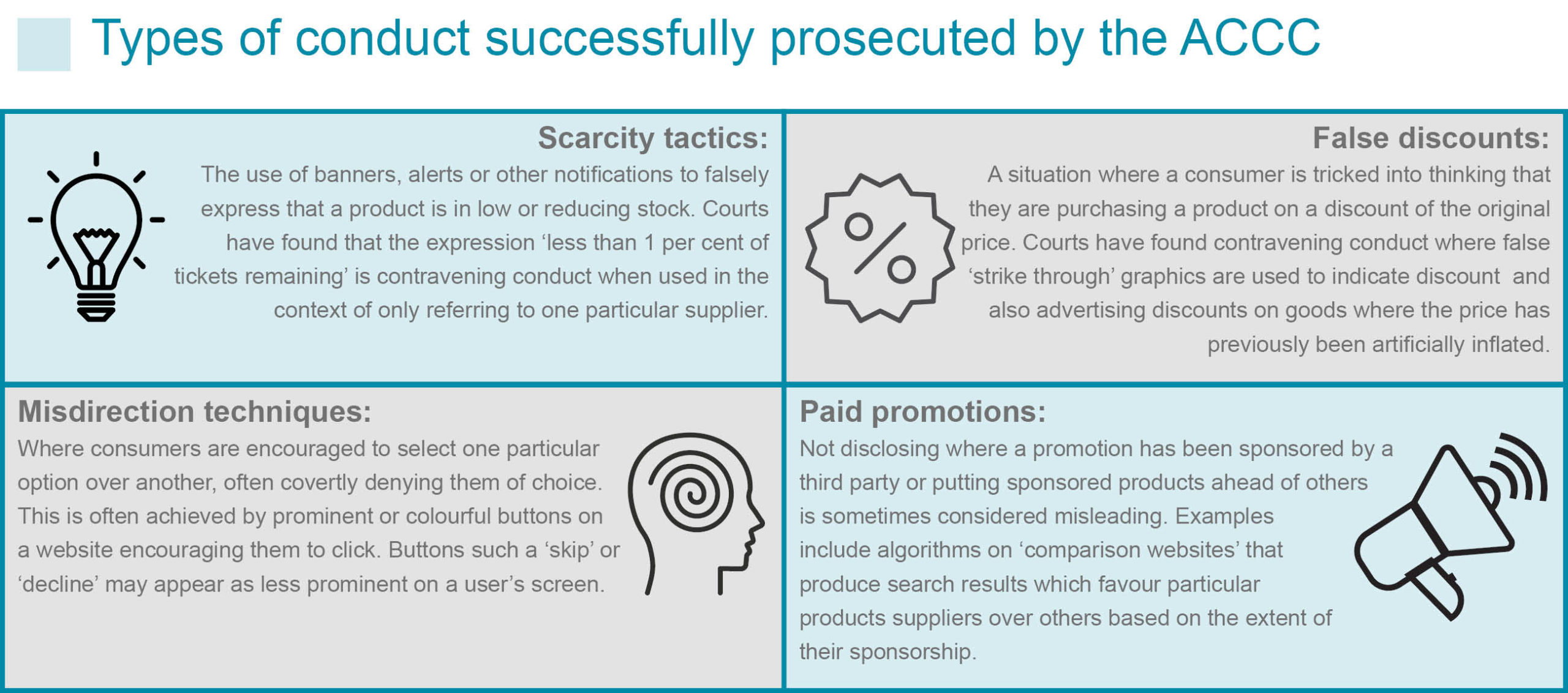Penalties for consumer law breaches on the rise: Federal Court finds Employsure penalty ‘manifestly inadequate’
The recent Employsure decision makes it very clear that penalties for breaches of the Australian Consumer Law (ACL), particularly where those breaches occur online, cannot be considered a ‘cost of doing business’ by companies assessing risks around particular conduct or the adequacy of their compliance program.
The Full Federal Court, on an appeal brought by the ACCC, has tripled the penalty for six misleading online advertisements. A trend of higher penalties for ACL should be expected to continue.
Key Takeaways:
- The Federal Court recently allowed an appeal by the ACCC of a penalty judgment against Employsure Pty Ltd (Employsure), increasing an initial penalty for misleading online advertisements of $1 million to $3 million;[1]
- Risk to businesses has recently been compounded by a substantial increase in penalties for misleading or deceptive conduct, in line with a rise in maximum penalties;
- Recent case law also provides Courts with significant discretion as to the size of penalties to impose; and
- The existence, or non-existence, of effective compliance programs has been taken into account by Courts when determining penalties.
Overview
In 2021, the Full Federal Court of Australia found that six advertisements appearing on Google had been misleading to consumers and had breached section 18 of the ACL.[2] These advertisements related to workplace relations consultancy Employsure. The Court found that these advertisements conveyed an affiliation with an unrelated government agency. Please refer to our previous insight on this decision.[3]
The penalties hearing saw the ACCC submit that an appropriate fine for this type of conduct was $5 million. Employsure made submissions for a penalty of between $500,000 and $750,000. A penalty of $1 million was imposed for the contravening conduct.
In February 2023, an appeal by the ACCC was allowed which raised the penalty to $3 million. The judgment determined that the initial fine was manifestly inadequate and “failed to adequately reflect the seriousness of the contravening conduct, the variety of forms that it took and the period over which it occurred so that it did not achieve the necessary degree of general deterrence”.[4]
This judgment comes as the latest example of Courts enforcing relatively high penalties for breaches of the ACL. Employsure’s conduct is an example of one of the more minor breaches, with notable penalties for misleading or deceptive conduct in the last twelve months including $7 million[5], $21million[6] and as high as $60 million[7].
Increased litigation for allegedly misleading online content
Since the ACCC delivered its final report of its Digital Platforms Inquiry in June 2019, there has been a noticeable increase in litigation that centres on online search engines, social media platforms and other digital content aggregation platforms[8]. Popular online businesses such as Google, Uber, Airbnb and viagogo have all had proceedings commenced against them in recent years.
The contravening conduct that online sales platforms appear to have engaged in and that has caught the attention of the ACCC can be summarised as follows:

Increased risk of heavy fines
Over the past five years, maximum penalties have increased on two occasions – in August 2018 and November 2022. The recent increase has resulted in the maximum penalty for any individual contravention by corporation being the greater of:
- $50 million;
- three times the value of the benefit obtained; and
- if the court cannot determine the value of the benefit obtained, 30% of the company’s (and related bodies corporate’s) ‘adjusted turnover’ during the ‘breach turnover period’.
After the 2018 increase, the ACCC successfully pursued multiple fines that were targeted at ‘hitting the bottom line’ for larger corporate organisations. Most recently, the decision in the Employsure appeal reinforced the importance of the relevant maximums as providing a ‘yardstick’ in determining penalties[1]. The latest increase will apply to conduct that occurs on or after 10 November 2022.
Courts have wide discretion
Courts have relied on a variety of principles to avoid the ‘mechanical application’ of maximum penalties and give themselves a wider discretion as to a final dollar figure.
The case of ACCC v Reckitt Benckiser (Australia) Pty Ltd[2] played a central role in the Employsure judgment. Key principles of Reckitt include:
- The course of conduct principle: The Court in Reckitt determined that it was able to view a series of breaches as one single ‘course of conduct’. This was justified, it stated, by the fact that the number of breaches is incalculable. A notable feature of recent litigation against digital platforms is, because of high web traffic and an innumerable number of clicks, Courts are often unable to determine the number of breaches that have occurred over a period of time and have used this principle to ultimately justify severe fines.
- The primacy of deterrence: The ACCC argued in Reckitt that the manifest inadequacy of fines had the effect of corporations viewing them as simply a ‘cost of doing business’. The Court broadly accepted this in Reckitt, emphasising that “the objective of any penalty in this case must be to ensure that Reckitt Benckiser and other ‘would-be wrongdoers’ think twice and decide not to act”. Many recent judgments, including Employsure, also reflect a similar focus on ‘deterrence’ as a platform to impose substantial penalty.
While Counsel for Employsure argued that the $6 million penalty in Reckitt represented a relatively small fine for conduct that was far more serious than that of their client’s, it was seen by the Court in a different context. Specifically, the judgment viewed Reckitt through a contemporary lens, finding that more recent comparative cases supported the view that a $1 million fine was manifestly inadequate.
Compliance
A key takeout of Employsure and other case law mentioned above, is that Courts consistently refer to evidence relating to compliance programs, in order to gauge the severity of the contravening conduct. Such examples include:
- Compliance policies that did not mention the ACL were viewed negatively.[1]
- Heavier penalties were applied when it appeared as though the ‘warning signs’ of potentially contravening conduct had been ignored.[2]
- Courts have had regard to a ‘culture of compliance’, punishing businesses that appeared to have not taken steps to address consumer laws.[3]
Notably, in both the primary judgment and the appeal, Employsure’s compliance program was considered a mitigating factor in the imposition of penalties. This case in particular shows the importance of taking swift action after identifying conduct that may be potentially in contravention of the ACL.
If you would like further information or would like us to review your company’s systems, processes or procedures for compliance with the ACL, please do not hesitate to contact Edward Martin.
If you found this insight article useful and you would like to subscribe to Gadens’ updates, click here.
Authors:
Edward Martin, Partner
Joseph Abi-Hanna, Associate
William Doble, Lawyer
[1] Australian Competition and Consumer Commission v Reckitt Benckiser (Australia) Pty Ltd [2016] FCAFC 181
[2] Ibid
[3] Australian Competition and Consumer Commission v Trivago N.V. (No 2) [2022] FCA 417
[4] Australian Competition and Consumer Commission v Employsure Pty Ltd [2023] FCAFC 5 at [45]
[5] [2016] FCAFC 181; (2016) 340 ALR 25
[6] Australian Competition and Consumer Commission v Employsure Pty Ltd [2023] FCAFC 5
[7] Australian Consumer Law (Schedule 2) Competition and Consumer Act 2010 (Cth) Section 18
[8] Please see “Approved by who? Referring to government in advertising”, available on pages 14 to 16 at the following link.
[9] Australian Competition and Consumer Commission v Employsure Pty Ltd [2023] FCAFC 5 at [73]
[10] viagogo AG v Australian Competition and Consumer Commission [2022] FCAFC 87
[11] Australian Competition and Consumer Commission v Uber B.V. [2022] FCA 1466
[12] Australian Competition and Consumer Commission v Google LLC (No 4) [2022] FCA 942 (decision was later reversed on the basis of liability)
[13] https://www.accc.gov.au/system/files/Digital%20platforms%20inquiry%20-%20final%20report.pdf

